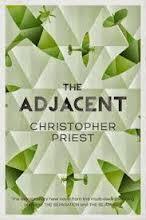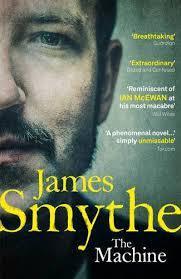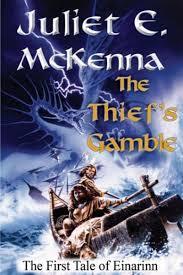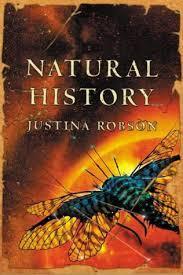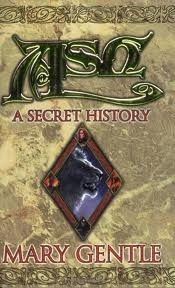Adrian Tchaikovsky's Blog, page 14
May 19, 2014
Casting Call! Shadows of the Apt: the Movie
Is not a thing. Let's get that straight right away. But as it's one of those things you speculate about, I'm interested in any thoughts people might have about actors and characters. Feel free to bung your suggestions in the comments, or to be on Facebook or Twitter (@aptshadow) or Goodreads. Then, when I have a few, I'll set out a dream team cast because hell, if you can't dream, what can you do? And feel free to suggest actors who are, you know, dead, or whatever, because there ain't no film so why not. But please do remember that Beetles, for example, are dark-skinned and so forth. No whitewashing  . Tune in soon for the casting director's pick.
. Tune in soon for the casting director's pick.
Share this
May 3, 2014
Other People's Trumpets
I figure I've talked enough about how I'm shortlisted for the Gemmell Legend Award and desperately need every vote I can get so I want to highlight some excellent stuff I've read recently. I've been on something of a reading spree , mostly because I've been travelling around and that tends to give me more time for it. On this happy note, you should really think about giving a try to:
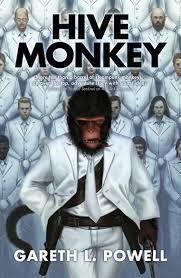 Gareth Powell's Ack-Ack Macaque won the British Science Fiction Award for best novel (jointly with Leckie's Ancillary Justice which also won the Clarkes), and at pretty much exactly the point this was going on, I was half way through the sequel. Macaque is a justly celebrated book, innovative, filled with excitement, eminently readable and dominated by the titular simian protagonist. The plot is part Bond, part Cyberpunk, all monkey action.
Gareth Powell's Ack-Ack Macaque won the British Science Fiction Award for best novel (jointly with Leckie's Ancillary Justice which also won the Clarkes), and at pretty much exactly the point this was going on, I was half way through the sequel. Macaque is a justly celebrated book, innovative, filled with excitement, eminently readable and dominated by the titular simian protagonist. The plot is part Bond, part Cyberpunk, all monkey action.
Hive Monkey sets the Macaque against a new world threat, grander, more complex and more intriguing than the last. There's the same combination of high tech and pulp action, and if anything I enjoyed it even more than the original: as a second book, Powell has settled into the characters and the world, and the presence of the lead character from the start keeps everything nipping along swiftly, if only because Ack-Ack Macaque just doesn't wait around. Hive Monkey allows Powell to take a remarkably complex look at Macaque's character, a creature without peers or kin, created as a joke and now unleashed on the world like a hairy Frankenstein's Monster.
 I've been meaning to read some Anne Lyle for a while now, on the back of very favourable reviews from a number of quarters, and I finally had the chance to get Alchemist of Souls under my belt last weekend. I think I had been put off a little by expecting one of those insanely Byzantine factions and politics sort of historical fantasies, which I can (on a purely personal level) find a bit dry. Alchemist certainly delivers on that level (in a good way), but there is so much more to the book than that. I was well aware that Lyle knew her stuff, and she does manage to paint a picture of Elizabethan England that is rich in detail whilst not being cluttered by it — she gives us the theatre (without any more than a mention of Shakespeare, which I think is all to the good) and the court and the life of a mostly failed soldier and duellist, the protagonist Malverny. However, as we learn about her England, it's quickly clear that history has taken a few left turns along the way, because England is playing host to "Skrayling" ambassadors who are very plainly not the inhabitants of the New World that we might expect, and the mystery of the Skraylings and their overtly supernatural abilities is the backbone of the book. Lyle's ability to keep both her historical and fantastical plates spinning without clashes makes for an absorbing read.
I've been meaning to read some Anne Lyle for a while now, on the back of very favourable reviews from a number of quarters, and I finally had the chance to get Alchemist of Souls under my belt last weekend. I think I had been put off a little by expecting one of those insanely Byzantine factions and politics sort of historical fantasies, which I can (on a purely personal level) find a bit dry. Alchemist certainly delivers on that level (in a good way), but there is so much more to the book than that. I was well aware that Lyle knew her stuff, and she does manage to paint a picture of Elizabethan England that is rich in detail whilst not being cluttered by it — she gives us the theatre (without any more than a mention of Shakespeare, which I think is all to the good) and the court and the life of a mostly failed soldier and duellist, the protagonist Malverny. However, as we learn about her England, it's quickly clear that history has taken a few left turns along the way, because England is playing host to "Skrayling" ambassadors who are very plainly not the inhabitants of the New World that we might expect, and the mystery of the Skraylings and their overtly supernatural abilities is the backbone of the book. Lyle's ability to keep both her historical and fantastical plates spinning without clashes makes for an absorbing read.
The next one I can't give you a cover for, nor can you at this point in time actually go and obtain the book, so bear with me. You will recall that Kameron Hurley's God's War was up for the Clarkes, and was pleasantly full of all manner of insecty goodness. I was lucky enough to be given the chance to read an advance copy of her new fantasy, Mirror Empire, which Amazon says will be out in late August. I am, frankly, somewhat awed by what I found. You know how I am with world-building, and the importance I place on creating original fantasy worlds. What Hurley gives us a window on, in Mirror Empire, is perhaps the richest and most different fantasy setting I've ever come across. Everything has been thought through in meticulous detail to create a living, breathing setting that owes nothing at all to the usual fantasy tropes — societies, ethnicities, magic, environment, gender politics, sexuality, everything is new, and everything supports the story of a clash of cultures, worlds and magicians. This really is a superb book, and you should keep an eye out for it when it hits the shelves (/e-readers).
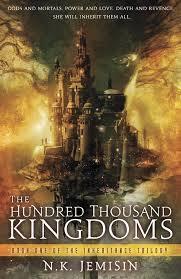 Finally, I am just finishing NK Jemisin's Hundred Thousand Kingdoms, another book that's been on my radar (and to-read shelves) for a long time. Again, I may have been a bit leery of too much complicated politics given the premise: the protagonist is summoned from her backwater home to the centre of power by her grandfather, ruler of a spiteful, bitter family that rules all the world, and gets plunged into the sort of cruel and Machiavellian court that would make Joffrey Baratheon take a step back. This is not what the book is about though; or this is not only what it's about. The ruling Arameri, amongst whose number the heroine finds herself, rule by divine right, in a very literal way, and for those who offend them, they have gods and demonson the leash, ready to enact their will. The plots that unfold in the pages mix human ambition with the schemes and desires of fallen deities, and all with Jemisin's elegance of language and plenty of games with the precise status of the narrator — the reader is constantly being subtly wrong-footed by sly afterthoughts and comments as the events are revealed. I've written before about how much I enjoy really poetic language in fantasy — writers like Peter S Beagle, Mervyn Peake, Frances Hardinge and Patrick Rothfuss. Jemisin is another of those writers who have an enviable command of the language. She also absolutely nails the non-human elements of her divine characters — trapped in human form, shaped by human wishes, and yet still they are disturbing and primal and make the hair on the back of your neck twitch. The scenes between the protagonist and Nahadoth are frankly some of the most powerful I've read in a long, long time.
Finally, I am just finishing NK Jemisin's Hundred Thousand Kingdoms, another book that's been on my radar (and to-read shelves) for a long time. Again, I may have been a bit leery of too much complicated politics given the premise: the protagonist is summoned from her backwater home to the centre of power by her grandfather, ruler of a spiteful, bitter family that rules all the world, and gets plunged into the sort of cruel and Machiavellian court that would make Joffrey Baratheon take a step back. This is not what the book is about though; or this is not only what it's about. The ruling Arameri, amongst whose number the heroine finds herself, rule by divine right, in a very literal way, and for those who offend them, they have gods and demonson the leash, ready to enact their will. The plots that unfold in the pages mix human ambition with the schemes and desires of fallen deities, and all with Jemisin's elegance of language and plenty of games with the precise status of the narrator — the reader is constantly being subtly wrong-footed by sly afterthoughts and comments as the events are revealed. I've written before about how much I enjoy really poetic language in fantasy — writers like Peter S Beagle, Mervyn Peake, Frances Hardinge and Patrick Rothfuss. Jemisin is another of those writers who have an enviable command of the language. She also absolutely nails the non-human elements of her divine characters — trapped in human form, shaped by human wishes, and yet still they are disturbing and primal and make the hair on the back of your neck twitch. The scenes between the protagonist and Nahadoth are frankly some of the most powerful I've read in a long, long time.
Okay, I know I said finally, but finally finally, I have not yet got my sweaty hands on a copy of Paul Cornell's Severed Streets, but by the sacred jockstrap of Robert E Howard, I will. I have not been shy in saying how much I loved London Falling, and the sequel is probably my most anticipated book for 2014(1).
(1) except for Seal of the Worm. That's going to be awesome, naturally. :)
Share this
April 22, 2014
Let Me Axe You Something 2 : Another Big Axe
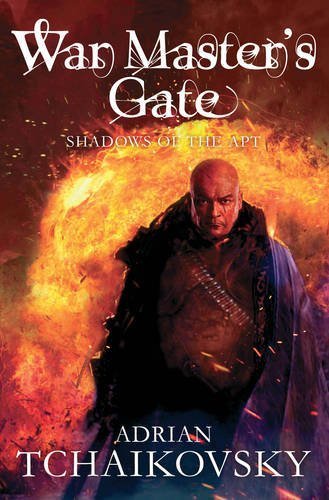 Well, obviously my nemesis Doctor Penguino (1) has had word of my general allergy to awards, because I suddenly find myself on the David Gemmell Legend award shortlist!
Well, obviously my nemesis Doctor Penguino (1) has had word of my general allergy to awards, because I suddenly find myself on the David Gemmell Legend award shortlist!
Seriously, though, I am insanely grateful to everyone who cast their vote for me. This is the first time I've clawed my way onto a shortlist, and it's with book 9 of a series. And blimey, look at the names making up that list: Sanderson (/Jordan!), Brett, Lynch, Mark Lawrence and me. This is humbling company to be in.
But, like that phishing email you now wish you'd never responded to, here comes the next request: I would be very, very grateful if anyone whose conscience so dictated would go back to the Legend Award site and cast their stone in the shortlist hustings. It's the same deal as before, no registration or other shenanigans, just click on the link, select and click the vote button. I appreciate that I'm stepping into the ring with some giants of the genre, but it would bring me great pleasure to be able to entitle a blog post "Hit by an axe" some day (2).

(1) Believed dead after the destruction of his volcano lair as depicted on this biscuit wrapper:
(2) Although "Narrowly missed by an axe" still works.
Share this
April 11, 2014
Arthur's 'Alf Dozen
A woman tries to rebuild her husband's mind using the machine that dismantled it; a botanist touches the soul of a planet; the mind of a warship plots revenge on the powers that destroyed it; a photographer tries to come to terms with his inexplicably dead wife; a scientist experiments with a drug that allows direct access to the minds of others; a disillusioned holy warrior hunts fugitives using insect-powered tech.
What's on offer on the Clarke Awards shortlist this year? — or — Let's see if we can get through a post about any kind of SFF award without it somehow becoming a national scandal (1).
I have a lot of time for the Clarke awards. It's the only SFF award I'm aware of (2) where a bunch of people sit down and just read every damn book on the longlist before deciding which they think is most meritorious. That's a whole lot of work going into producing a shortlist (3). This year, we have a varied and intriguing cross-section of where the genre is going.
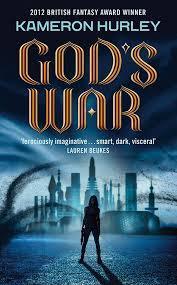 God's War by Kameron Hurley (Del Rey)
God's War by Kameron Hurley (Del Rey)
The first of a series and Hurley's first published long fiction, God's War gives us a planet gripped by a holy war. A former Bel Dam (a hunter of deserters) turned bounty hunter teams up with an enemy expatriate for the shadiest of shady assignments tracking down a missing alien ambassador. The story — like its protagonist — is brutal, complex and desperate, overshadowed by the generations-old war that has become the driving force on the planet. God's War is an action SF — the characters are well-drawn, and they're constantly in trouble. The setting is remarkable for presenting multiple Islamic cultures without homogenising them and for the bizarre biotech that underlies the nations and their bitter war — a technology of insects and infection whose practitioners straddle the line where sufficiently advanced technology becomes magic.
 Ancilliary Justice by Ann Leckie (Orbit)
Ancilliary Justice by Ann Leckie (Orbit)
Another debut, the protagonist of Justice is the AI of a capital ship that, in its heyday, controlled a vast number of slaved human ancillaries to serve as the army of the Radch, an ruthless expansionist empire. Except the expansion is on hold and events have seen her ship destroyed, her intelligence restricted to a single human body. She wants revenge. The plot plays out 'now' as she puts her plan into action, and 'then' showing the events leading up to the ship's loss. The non-human protagonist is very well realised — getting inside the mind of something that is human only via the reflections of the humans it has had dealings with. Not only does Leckie give us a genderless lead, because the Radch language has no gendered pronouns, the actual genders of most of the other characters remain undetermined, which is an elegant way of emphasising the alien-ness of the narrator and her culture.
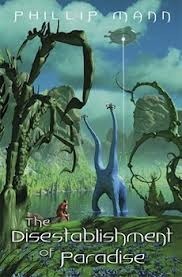 The Disestablishment of Paradise by Phillip Mann (Gollancz)
The Disestablishment of Paradise by Phillip Mann (Gollancz)
Phillip Mann has a distinguished pedigree in SF, and this is his first book out since 1996. Paradise is very much old-school SF. The protagonist is a botanist trying to come to terms with the ecology of Paradise, which in the years since its naming has become more and more antithetical to its human colonists. At the start of the book the authorities are writing the planet off and pulling everyone out, but rather than give up, she goes walkabout in the alien ecosystem on a journey as much spiritual as physical, opening herself to the planet's soul. Paradise is the account of an outsider looking in — both the botanist trying to connect with her planet, and the fictional writer later chosen to present her story.
 Nexus by Ramez Naam (Angry Robot)
Nexus by Ramez Naam (Angry Robot)
What if there was a drug that let you touch the minds of others? Wouldn't that be fantastic? Yes, Naam shows us. It would also be terrible, and a lot of people would do whatever it took to stop you using it, and to weaponise it, and all that bad stuff. In contras to the above three, Nexus is very near future, a cyberpunk techno-thriller that explores, deftly and intelligently and at a breakneck pace, just how this sort of innovation would be greeted by a world that has already gone on from the War on Terror to the War on Emergent Technology. Naam has the essential gift for this sort of SF: he is frighteningly plausible — also funny, heart-rending and able to present even the 'bad guys' in such a way that we can completely understand why they do what they do.
The Adjacent by Chrisopher Priest (Gollancz)
Christopher Priest is one of the most celebrated Britsh SF writers, an author whose name should really be an adjective to describe a sub-genre, save that nobody else writes quite like him. The Adjacent's main narrative follows Tibor Tarrant returning to a near-future dystopian Islamic Republic of Great Britain after the death of his wife to an inexplicable weapon — a weapon of utter annihilation now being deployed across the country. Of course, being a Priest novel, nothing is that simple. Tarrant's story is intercut with vignettes from other places, other times, even touching on locales from other works in the Priest canon. The book is a puzzle where the reader pieces together themes, characters and images: magicians, planes, photographic images, war, and of course the weapon to end all wars, the impossible, obliterating Adjacent.
The Machine by James Smythe (Blue Door)
Smythe gives us a dystopian Britain like and unlike Priest's, wracked by the violent repercussions of climate change, with London destroyed by floods, and the Isle of Wight become a sink estate for all those who can't afford to be anywhere else. The lead is a teacher whose soldier husband suffered from post-traumatic shock. Then they invented a machine to remove the problematic memories, but they kept cutting and cutting, and in the end there was nothing left. Now she has a machine of her own, and a tape of his memories, and she's going to get him back. The Machine is a brooding novel. Its present-tense telling is claustrophobic, trapping you in the now without any ability to look ahead. There are plenty of twists, each nastier than the last. It was a book that left me with a very bleak feeling when I turned the last page, and then kept me thinking about it for days afterwards, always the mark of a wrll-written novel.
Six of the best, then — all very different books, going out to the far-flung corners of the genre: spaceships, aliens, transhumanism, dystopias, biotech, linked time, the human mind(4). The award event itself is on the 1st of May.
(1) Seriously, it's about the only time the literary end of the genre comes to the attention of the mainstream — either one author is bitching about the shortlist, or there's a spat over the presenter, or there's an all-but outright scandal about impartiality. It's very tiresome.
(2) Happy to be corrected.
(3) which shortlist is then dissected and derided by all and sundry because Internets.
(4) As an idle exercise I decided you could string the books together in a circle using linked concepts, so: God's War — future war — Ancillary Justice — transhumanism — Nexus - mind-altering technology — The Machine — dystopic Britain — The Adjacent — symbolic journeys — Paradise - alien ecology — back to God's War again. All nonsense of course, but hey…
Share this
April 6, 2014
Breaking the First Rule of Fight Club
 So a couple of weeks ago I was at the unveiling of (wait for it) The Lost Second Book of Nicoletto Giganti. This is not a sequel to a fantasy blockbuster about giants. Instead, it’s an early 17th century fencing manual. Fellow author Anne Lyle was also there, and her report is here.
So a couple of weeks ago I was at the unveiling of (wait for it) The Lost Second Book of Nicoletto Giganti. This is not a sequel to a fantasy blockbuster about giants. Instead, it’s an early 17th century fencing manual. Fellow author Anne Lyle was also there, and her report is here.
This is a fascinating example of how the discovery of a single document can change the way an entire area of history is seen.
Nicoletto Giganti was a fencing master, and his first book is well known, a tome dealing primarily with the application of the thrust when duelling with rapier or rapier and dagger. The book is well known and praised by various scholars of the fight from his time on, and it has been taken as a benchmark of where the science of the sword was going – from the medieval hacking about to the renaissance poking people with sharp things. In fact Gigangi’s book is exactly the sort of thing that George Silver bitches about – the English Silver’s own text can be handily summarised as “You bloody mincing Italians, I’ll take you all on.”
There were rumours of a second book, but no actual evidence it ever got written, until Piermarco Terminiello and Joshua Pendragon happened across what had been thought to be an inferior 2nd edition of the first book in the Wallace Collection, but which turned out to be the only known surviving copy of the second book.
From the frontispiece it becomes apparent that Giganti had become master of arms to the Knights of San Stefano, who were basically a bunch of anti-Ottoman privateers operating out of Pisa, and who probably had little to do when not plundering and raiding other than fight each other and everyone else. Giganti’s second book is therefore “everything else” – sword against multiple opponents, dagger against dagger, sword and shield, grappling and how to defend yourself against a man with a spear when all you’ve got is a fruit knife.
Instantly, therefore, the image of Giganti as the champion of the formal and mannered salle duelling – and nothing else – is banished. Here is a book for the man about town in a violent time and place. And it’s full of pictures of naked men stabbing each other in the eye ( which the artist has sometimes executed with more bloodthirstiness than actual skill, but there you go.)
Giganti's second book, translated, can be purchased on Amazon, or Spacewitch are selling an extremely snazzy leather-bound edition here.
Share this
March 10, 2014
Teacher's Favourites
One question that turns up a lot, from readers and in interviews, is "Which characters are your favourites to write?" And of course I love all my insect-kinden children, even the ones I brutally kill off seconds after you meet them, but it's true there are a few who are an especial joy to write for. And 'write for' is the right phrase. Once a character is established, then writing a scene with them in is like working with an actor of long acquaintance. You know them, their strengths, their style. It becomes easy to make them look good.
Here is the pick, then, of the characters who have been the most fun for me to work with. But warning — Spoilers from hereon in.
Thalric
Ah Thalric. Thalric has been fun to write from the start. The man of duty who betrays, and is betrayed, so many times that even he forgets whose side he's meant to be on. A murderer, secret policeman, spy, torturer even: and these are his activities before his fall from grace. That is Thalric at his straight-laced Imperial best. It's only after everything goes to crap for him, and he falls foul of the Rekef's internecine struggles, that he discovers a wider world, both inside and outside. One part Sharpe to three parts Avon, a constant source of carping criticism on any subject you care to name, and willing to stand up to generals and great magicians — anyone in fact except the Empress. Best moments: The Scarab Path is Thalric's book almost as much as it is Che and Totho's, but his showdown with General Reiner in Salute the Dark was a favourite too.
Uctebri
The Mosquito-kinden, Uctebri the Sarcad: vampiric, treacherous (something of a theme here), and ambitious enough to conceive a plan to rule the world through a puppet Emperor. What's not to like? Actually Uctebri is fun mostly when he's playing his double-act with Seda. The relationship between them starts off as mad magician and damsel in distress, and then shades into something closer to an equal partnership as she learns from him. His influence on her is in toughening her up — taking her out of her brother's shadow. Hers on him is to hold a mirror up to him. Seda makes Uctebri see himself through her eyes. She makes him self-conscious, aware of his age and his nature. Best moments: his spirit-meeting with Achaeos in Blood of the Mantis; his explanation of magic (the most precise in the series, and one that is very relevant for the ongoing series) for Seda in Salute the Dark.
Drephos
We do seem to be having a run on villains? Is Drephos a villain? Yes, to be honest, he really is. But he's not in the same box as Uctebri. Drephos, prima donna engineer, the highest-ranging halfbreed in the Empire, bona fide genius, and a man for whom such notions as genocide hold no sting. And yet, at the same time, Drephos the equal opportunities employer, heedless of heritage or gender so long as you can keep up with him. Drephos, who is an inspiring father figure for Totho — indeed who shows Totho more kindness than his other mentor, Stenwold Maker, who cannot quite get past the miscegenation problem. Drephos shines most when he's contrasted with Totho, and through the series the two of them change each other, growing closer as the world puts pressure on them. Best moment: without a shadow of a doubt the conversations between Drephos and Totho in Salute the Dark, where Drephos puts such a case together, in support of mass murder, that I could give Totho no good arguments in response.
Straessa and Gorenn
Straessa the Antspider has a very sharp and defined character arc, from a troublemaker who is happy to cheat at the Prowess Forum through to a volunteer officer in Collegium's military. Castre Gorenn is a renegade Dragonfly archer come to fight the Wasps on behalf of Collegium. When do the two become a double act? It develops in War Master's Gate, where Gorenn turns from Comedy Inapt to sheer dynamite as the war gets nastier, but the big moments for the two of them are still to come in Seal of the Worm. Obviously that limits what I can say, but it's the combination of Straessa's Apt pragmatism, and Gorenn's Inapt (and at times completely mad) idealism that's the spark.
te Mosca
Sartaea te Mosca, Fly lecturer in Inapt studies, made my previous list as well, so I won't say too much about her here. The fun with her is that, no matter what, she is meticulously polite. She grew up amongst Moths who spent their time looking down on her physically and magically, and her defence to that — and against the world in general — is to behave with rigid decorum, ploughing her diminutive way through the trials of life behind a shield of good manners. Her best moments also come in Seal of the Worm, where she meets difficulties that even her best behaviour cannot overcome.
Averic and Eujen
Another double act: a Beetle scholar whose society gives him the leisure to criticise his leaders, and a Wasp exchange student from an Empire where a word out of place could see you on crossed pikes. A pair of unlikely best friends in the face of the Imperial advance in The Air War. I'm going to shirk this entry, because of all the things I don't want to spoil, the crisis point of their friendship is one, but writing Eujen and Averic, and especially that crisis, was one of my favourite parts of War Master's Gate.
Oski
A bit part player, for sure, and I honestly couldn't say where the idea for an Imperial Fly-kinden artillery officer came from, but once he was there, the fact of his kinden gave him a great deal of character. Oski is mostly fun because he's a tiny, tiny man in a world of big Wasp soldiers and even bigger machines, and he spends his entire time shouting and swearing at people because it's the only way he can do his job. He's also yet another character whose best personal moments are yet to come in Seal of the Worm
Arkeuthys
Rupert of Hentzau in the shape of a gigantic octopus. What's not to like?
Share this
March 6, 2014
Let Me Axe You Something
It's that time again, a small trumpet-blowing post appealing to your love of democracy (1).
The David Gemmell awards longlist is up, and War Master's Gate is on it. Although I have a well-advertised allergy to any kind of award — meaning that the world, out of consideration for my fragile health, has ensured I never get near any — there's always a chance to at least hit the shortlist, which would only bring me out in hives and would probably be survivable. Voting is open to everyone, and all you need to do is hop onto their site here and cast your stone as your conscience demands. But, as you're about to click, imagine me stumbling down a wintry street like a Dickensian beggar, stopping at the big awards ceremony and pressing my nose to the window, ignored by the cheery throng inside. Just saying.
There are also two other awards on the go. The Morningstar award is for best newcomer (2), whilst the Ravenheart award is for cover art, so while you're there you should pick a horse for those races too.
(1) and, hopefully, of Shadows of the Apt.
(2) You know, the award that started up one year after I would have been eligible. Not that I'm bitter or anything. After all, I must think of those allergies.
Share this
February 26, 2014
Friends, Foes and Rivals
You have probably seen this link by now, at least if you live anywhere near my corner of the Social Mediadrome. The response has been pretty much what you might expect, with people essentially picking it up, carrying it to a big stack of wood and setting fire to it. Lynn Shepherd has been villified, accused of jealousy, and had her books receive negative reviews on Amazon, apparently, from angry Potter fans — in fact, whether you agree or disagree or just don't care about what she's saying, the general response has veered far too deeply into the sort of berserker rage that helps nobody and makes nobody look good. However, the whole shebang does feel a bit like that rare Publicity that is actually Bad, and also so insanely predictable that you wonder precisely what the intended result was.
The content of the article is basically "Rowling Go Home," is full of rather snyde wizard references, and ends up with "Remember what it was like when The Cuckoo's Calling had only sold a few boxes and think about those of us who are stuck there, because we can't wave a wand and turn our books into overnight bestsellers merely by saying the magic word." This is, frankly, a really bizarre idea, that JK Rowling is eating all the literary pies and leaving none for all the other authors.
Maybe it's different in Shepherd's genre. One is tempted to suggest that maybe, amongst mystery writers, you can never tell who the villain is, and you creep from gloomy room to gloomy room always terrified of a knife in the back, but that would be shameless literary brinksmanship and I won't do it. But seriously, that isn't it. It can't be like that.
OK, reductio ad absurdum, let's say a reader goes into a bookshop with enough pence in her pocket for only one book, and so she'll either buy one of mine, or one from that fellow Abercrombie. And so we can't both win, and either I or Joe will have the price of a Twix added on to our royalty statements. And at the next convention, I'll look across the bar and see him eating that Twix, and jealous rage will overcome me, and we'll have some kind of Kurosawa-style faceoff where he'll end up standing three paces behind me staring into the distance and then my head will fall off.
Anyway, the thing is, people who buy Joe's books also buy mine (1), and vice versa. We're neighbours in generally edged-weapon-related fantasy, and people read multiple books and multiple authors. People buying books from authors published by my publisher, or represented by my agent, or in my genre, or anywhere near my genre, these all help me in various ways. People buying books, just fiction of any kind at all helps, because the more books people buy, the more they will buy. It's not some weird zero sum setup, where suddenly they've had their allowance of books and aren't allowed any more. Reading grows reading grows reading. Otherwise there would be no reason to stick "Comparable to Tolkien at his best" on the dust jacket, because they've gone and bought Tolkien, haven't they, so they have no space in their lives for anyone else.
So yes, there's always the competition, but the thing that first struck me when I finally met other authors (2) is how little of the snark, the one upmanship and the backbiting there was. I was truly expecting to be F*cking New Guy and to have to make the tea and the beds of everyone else on pain of ostracism, and instead everyone was really supportive (3). Is it just the SFF crowd? Because amongst authors I know, there is a real 'all in it together' feeling. Yes, we are rivals in a way, but rivals on the same team. The only kind of author who is going to damage anybody's sales is the writer who tells people not to read.
(1) Amazon tells me so.
(2) In this case Paul Cornell, Peter F Hamilton, Gary Gibson, Mark Charan Newton and China Mieville at the very first SFX Weekender.
(3) And I do my damndest to pass that down the line with new authors I meet, because it's the Way it's Done.
Share this
February 21, 2014
So, You Don't Like Twilight
So, genre and gender is still making the SFF industry look ridiculous, now sufficiently so to catch the derisive attention of reporting well outside the genre, and at the same time as the ripples from that farrage(1) were still crossing the water, (NK Jemisin has a good take on it here) we got Foz Meadows' report that Waterstones' SFF primer is, well, skewed demographically in a way that does not represent the actual body of writers it is choosing from(2). Emma Newman has a very sound commentary here.
I'm not going to rehash my Big Serious Post. I did want to address a particular reaction I've seen to the highlighting of this issue, and the promotion of women writers. For example, one response to that Big Serious Post was:
"I'm seeing the inclusion of near pornographic "romance" into the SFF world as something to be fought against. And if the non-porn female authors want to be taken seriously, they need to do something to distance themselves from that image."
and this was echoed in a comment that came up reecntly as part of the above-mentioned pair of farages, where the commenter basically allowed that Le Guin and McCaffrey were grade A authors but said that these were writers who "don't have to resort to hackeyed love triangles and politically correct garbage to draw in legions of fans. Write good solid books, be respected. Write a Harlequin romance with elements of sci-fi/fantasy, see derision and condescension."
This is essentially to approach the gender debate by whopping out a pair of fallacies, namely:
1. Women writers write romance
2. romance is yucky
(ergo women writers are yucky, to complete the syllogism)
Romance is one of the most important narrative elements there is. Romance isn't some anti-heroism that would annihilate a good heroic narrative if allowed to get into contact with it. Relations between men, women, monsters and giant spiders (4) are not just window dressing to garnish (5) an action story. So many of our great myths and stories (or 'romances' as they were known, albeit for reasons that have little to do with that) are all about the romance driving the action. The Iliad is a love triangle that took ten years and thousands of corpses to play out. Are you calling Achilles yucky? He'll kick your arse, believe me (5). And if it's the sex you're objecting to, all that sweat and fluids… just don't go near Richard Morgan, then. Seriously, elaborate conjugations are not solely the province of female writers.
And the suggestion that there is some kind of omnipotent judging process at work, to let "proper" women writers (and, yes, McCaffrey and le Guin are superb, and their work was not devoid of romance) through whilst acting as a gatekeeper to pour scorn on all that sticky, sweaty stuff is simply not supportable.
Now, if these opinions are being advanced as a rationale for an already existing prejudice, well, no amount of example or rational argument is going to help. If this is a genuine reaction to a small number of admittedly ubiquitous publications, well… Look, you know what? I've not read Twilight. I've not read Fifty Shades of Grey. But I can say with my hand on my heart that nothing I have heard about either franchise suggests that I would enjoy them, and I've heard a lot from a large variety of sources to suggest I would find a great deal therein that I would object to. That's fine. But (a) I am not the target audience, and (b) that's hardly the final word on "romance" and © there is an enormous range of female authors out there, and they write a very wide varietyof SFF books where romance can figure as much or as little as you might want(6), and they very seldom get the same attention and recognition that male counterparts do.
Here are some recommendations, therefore — a drop in the ocean, as varied as you like.
Juliet E McKenna is a well regarded writer. I've read several of hers, and just finished her original 5-book sequence, Tales of Einarinn. Her books are excellent, original and dramatic fantasies, plenty of magic (and indeed two competing magics that have an Apt/Inapt feel to them (7)) and strong characters. While Juliet is certainly not an obscure writer by any means, she should seriously be up there with Sanderson and Erikson for strong, original fantasies. I can also strongly recommend KT Davies' The Red Knight which is a superb piece of writing, lots of action and some very elegantly written combat.
Jen Williams' Copper Promise is one I've mentioned before as a superb "hero-level" fantasy (as opposed to the politics, kingdoms and empires level that epic fantasy usually plays out on). Or, if you want something that's more the grim and gritty urban end of the spectrum, try Francis Knight's Fade to Black.
Weird
You like Vandermeer and Mieville? Go look out a copy of (the hard to find) Calenture from Storm Constantine, one of the few books I re-read on a regular basis. It's a surreal and complex story of mobile cities that pushes the reality/fantasy boundary like it's made of plasticine, and it's driven in very subtle and powerful ways by the relationships (often very non-standard) between characters. It's a beautiful story, one everyone should read, and the same goes for KJ Bishop's The Etched City. I cannot express properly just how exquisitely written this book is, and yes, it's a romance, and that's the point of the book. If you're a romanceophobe, but want to try some therapy this is a very good start.
Justina Robson's Natural History is pretty much the definitive book about hitting the man/machine singularity, and her Silver Screen is a clever and plausible investigation of AI. Her Lila Black series is a superb example of fast-paced, intelligent stories that cross the SF/fantasy boundary, with plenty of romance (and, indeed, sex). Tricia Sullivan's Lightborn is utterly chilling, a story of cybernetics and mental conditioning gone horribly, fascinatingly wrong.
Urban Fantasy
I have already waxed lyrical about Emma Newman's Split Worlds series, which was one of my picks of last year. And again — if you feel uncertain about romances, these books are very good examples of why romance doesn't have to mean girl-cooties. They're funny, witty and very well-written books.
Plenty to choose from here — Sophia McDougal's Romanitas series is alt.history SF, with a Roman Empire persisting into the present day, slavery and all. Anne Lyle has swashbuckling adventure in an otherwordly Elizabethan England in Alchemist of Souls, and Mary Gentle… seriously, go read everything Mary Gentle has written, for the perfect balance of historical erudition, wildly original fantasy and an understanding of the human condition — romance and all. Read Ash, read 1610, read Rat and Gargoyles. Just read.
And — this is just skimming the shelves. There are so many out there (and indeed as I finished this post, the Guardian got in on the act with some recommendations too). No more submissions, m'lud.
(1) A 'farrage' is best defined as a squawking sort of commotion heard from another room (3)
(2) The list is I think three years old, and Michael Rowley, mentioned on it, hasn't been with Waterstones for a while. From what Foz says it is still being used by the chain I believe, but happy to be corrected.
(3) Bluff!
(4) q.v. Spiderlight, for those who have read it.
(5) With his good foot, obviously. The other one's a bit tender.
(6) There is romance in Shadows of the Apt: Che, Tisamon, Tynisa, Straessa, Eujen, Laszlo, all of these characters have important romantic plotlines of various kinds.
(7) And predates my stuff by almost a decade, so I'm glad I've read them now, but kind of glad I hadn't read them before penning Empire
Share this
February 3, 2014
The Little People
I try to let plot, world and characters develop as organically as possible. One major upshot of this is that bit-part players, conjured into existence to fill a momentary need of the narrative, can take on a life of their own. If a niche arises for them, they can take on real lives of their own. Here are a few of my favourites who have elbowed their way into the story and earned their way into the big league. Big warning: moderate spoilers throughout — nothing that's a plot-killer, but still. I'll specifically try not to spoil any part of War Master's Gate.
Helmess Broiler and Jodry Drillen
I wrote about the way these two pushy Collegiate statesmen crowbarred their way into the narrative here. Suffice to say they went from a cameo and a mention in The Scarab Path to redacted minor characters in Empire and in Salute the Dark respectively, to major players by War Master’s Gate. Bloody politicians.
The Bellowerns
The first Imperial embassy to Collegium includes a Beetle diplomat named Honory Bellowern, and we see very little of him, save that he appears a bit green and gets on the wrong side of Thalric at one point. He turns up again on the diplomatic staff, in the Sea Watch and then is in and out of the narrative for the duration, so that someone who is just a name and a function essentially pieces together their own story of ambition in the Imperial hierarchy just from the brief moments when we see him. Later we meet presumably a relative, Founder Bellowern, an enterprising Consortium magnate, in Blood of the Mantis, a collector of rare curios. At that point, with the surname belonging to multiple characters, the family took on a life of its own, and in Seal of the Worm we even meet the aged patriarch, and get some idea of just how much clout the Bellowerns have. Their series function becomes an example of just how powerful non-Wasps can be in the Empire.
Balkus and Sperra
A couple of Scuto's footsoldiers from Empire, Balkus the nailbowman and Sperra the artificer/medic survived the fight at the railyards memorably enough that, when Stenwold needed some extra pairs of hands in Dragonfly they were the obvious choice. From there, they quickly graduated from spear-carriers to major characters. Balkus, the Wedge Antilles of the series, led the defence of Collegium against Vek and was the Collegiate PoV character in the major battle of Salute the Dark. Sperra drew the short straw and got herself tortured by the Sarnesh. In War Master's Gate they appear as the representatives of the new city of Princep Salma.
Te Berro
Te Berro is perhaps the best example of a minor player who somehow fits a complete personal plot arc in the background of the main plot. He starts life as a Fly-kinden Rekef officer backing up Thalric in Empire under the auspices of General Reiner. Later on he has defected to General Maxin's rising star, for whom (and for the Emperor and Uctebri) he engages Scylla, Gaved and others (and I'm not doing him here, but Gaved is another character just like this) to steal the Box of Shadows. When that goes south, he presumably incurs considerable disfavour, because by Scarab Path he is living incognito in an Imperial records office, where Thalric tracks him down. In exchange for his help, Thalric arranges for him to get transferred to sunnier climes, but Thalric's help is very seldom good for people. In the Air War te Berro meets a tragic end whilst trying, of all things, to mend his ways. There is actually an entire complex book's worth of plot attached to poor te Berro. A large chunk of the series could be written entirely from his point of view.
Castre Gorenn
In Air War there is a very minor character who nonetheless gets a memorable introduction. Castre Gorenn is a Dragonfly archer who refused to stop fighting the Twelve Year War — which amongst other things implies she is a traitor who is disobeying her Monarch. She turned up at Collegium's gates declaring herself to be the Commonweal Retaliatory Army and is blithely ignorant about almost everything to do with her newly adopted people. At first she's there for colour — for the same reason there are so many different nationalities in Casablanca, to show that the society under threat is diverse and inclusive, as opposed to the monocultural invaders (1). With that colourful start, however, Gorenn came to assume a very different function. As the situation deteriorates, as peace collapses and the war becomes desperate and savage, Gorenn shines. Her Inapt world of valour, recklessness and passion is far more suited to the chaos that war brings than is the ordered Apt world of the Collegiates.
Jons Allanbridge
Ah yes, Allanbridge the aviator, who turns up first (I think!) in Blood of the Mantis to ferry the heroes to Jerez, and has been ferrying ever since. A friend of Stenwold's, and someone who obviously trades in more than the merely legitimate, he's no Han Solo, but a businessman who wants no trouble. Instead of which he gets called on constantly and unfairly to carry people about to increasingly distant destinations. And he gets more complicated as he rubs shoulders with the protagonists, until by Sea Watch he is keeping dangerous secrets from Stenwold, and by War Master's Gate… but I said I wouldn't spoil any of that.
te Mosca
Sartaea te Mosca is introduced in the Air War basically to be the advisor, support and friend-in-a-high-place for Eujen, the Antspider and the rest. A Fly-kinden magician of very little power, she teaches magic to Beetles who don't understand it (having taken over the post from Doctor Nicrephos, who has his own little plot in Empire and Dragonfly). Her role persists into War Master's Gate, and she is one of the 'normal' Collegiates used as a touchstone for the effects of the war on the city. That's about all I can say for now, save that in Seal of the Worm she has a far more important, and hard-edged, job to do, enough to warrant her getting on this list. As an additional piece of trivia, there are a number of characters in the series that are very loosely inspired by friends of mine, and te Mosca is a fond nod to my friend and fellow author Frances Hardinge. So now you know.
Varsec
Varsec is practically the patron saint of this list. We don't actually know his name until Heirs of the Blade but he's kind of retconned into the continuity when he's introduced as the man behind the Imperial invasion of Solarno in Blood of the Mantis two books earlier. That invasion, characterised by daring air support and the use of Wasp mindlinking for communication, sets up Varsec as a maverick, and we meet him under the shadow of the axe. However, his plans for a new air force lead to the events of the Air War, and he is one of the few Imperial artificers who appears to be able to match Drephos idea for idea. His rocky career continues throughout the series, another little plot arc you can piece together.
Tynan
And General Tynan, commander of the Second Army, known as the Gears, because it just grinds on no matter what. Tynan was never meant to be a major character. He turned up towards the end of Salute the Dark when he brought an army to the gates of Collegium. He captured Stenwold Maker, and had the chance to do away with the Empire's greatest enemy. But he didn't. And in that one scene he has with Stenwold and Arianna, it turned out there was a real connection between Collegium's War Master and the general of the Gears. Tynan just sprang into being as a far more interesting and detailed character than the role probably merited, and although we hear nothing about him for several books, he was always in the back of my mind as a returnee. So it is that we find him working his farm in The Air War like a retired Roman when the call to arms comes in: the Second is marching again. And from that point, he's a sufficiently major protagonist that he gets his own character bio at the start of War Master's Gate.
(1) I am always rather depressed by settings where a monoculture — frequently militaristic to the point of fascism, is shown as the valiant defenders against a vastly diverse enemy. 300, Halo and Space Marines of all stripes, I'm looking at you.
Share this

